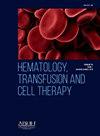An enigmatic tale of macrophages in bone marrow causing inflammation of the brain: A case report on CNS HLH
IF 1.6
Q3 HEMATOLOGY
引用次数: 0
Abstract
Background
Hemophagocytic lymphohistiocytosis (HLH) is a life-threatening immune disorder characterized by excessive inflammation and multiorgan involvement. Rarely, HLH can manifest with signs and symptoms isolated to the central nervous system (CNS). This case report highlights the unique clinical course of CNS-isolated HLH in a 19-year-old female who, despite a nine-year delay in diagnosis, achieved disease remission following a hematopoietic stem cell transplant (HSCT).
Case
The patient initially presented at 9 years old with seizures, ataxia, and progressive cognitive decline. Over the next nine years, extensive diagnostic evaluations were performed, including neuroimaging, cerebrospinal fluid analysis, and genetic testing. Genetic testing identified a compound heterozygous mutation in the PRF1 gene, confirming a diagnosis of familial HLH (FHL). The patient underwent hematopoietic stem cell transplant (HSCT) from an HLA-matched unrelated donor. Despite significant complications, including multiple infections and renal failure, she achieved remission. Six years post-transplant, the patient exhibited stabilization of neurological function, cessation of seizures, and absence of active HLH.
Conclusion
This case underscores the importance of considering genetic testing in patients with unexplained CNS symptoms and atypical radiological findings. Timely HSCT, even in cases with delayed diagnosis, can lead to remission and improved quality of life.
骨髓中巨噬细胞引起脑炎症的神秘故事:一例中枢神经系统HLH报告
噬血细胞性淋巴组织细胞增多症(HLH)是一种以过度炎症和多器官受累为特征的危及生命的免疫疾病。罕见的,HLH可以表现出体征和症状孤立的中枢神经系统(CNS)。本病例报告强调了一名19岁女性cns分离的HLH的独特临床过程,尽管诊断延迟了9年,但在造血干细胞移植(HSCT)后实现了疾病缓解。患者最初在9岁时表现为癫痫发作、共济失调和进行性认知能力下降。在接下来的9年里,进行了广泛的诊断评估,包括神经成像、脑脊液分析和基因检测。基因检测发现PRF1基因的复合杂合突变,确认了家族性HLH (FHL)的诊断。患者接受了来自hla匹配的非亲属供体的造血干细胞移植(HSCT)。尽管出现了严重的并发症,包括多重感染和肾衰竭,但她的病情得到了缓解。移植后6年,患者表现出神经功能稳定,癫痫停止,没有活动性HLH。结论本病例强调了在有不明原因的中枢神经系统症状和不典型影像学表现的患者中考虑基因检测的重要性。及时的造血干细胞移植,即使在延迟诊断的情况下,也可以导致缓解和改善生活质量。
本文章由计算机程序翻译,如有差异,请以英文原文为准。
求助全文
约1分钟内获得全文
求助全文
来源期刊

Hematology, Transfusion and Cell Therapy
Multiple-
CiteScore
2.40
自引率
4.80%
发文量
1419
审稿时长
30 weeks
 求助内容:
求助内容: 应助结果提醒方式:
应助结果提醒方式:


